December 2022 Executive Summary for the Seventh Report of the Federal Monitor, Covering the Period from April through September 2022
Federal Monitor
Case 3:12-cv-02039-FAB Document 2264-2 Filed 12/15/22
This is the seventh Chief Monitor’s Report (CMR-7) outlining the compliance levels of the Commonwealth of Puerto Rico in relation to the Consent Decree entered between the United States and the Commonwealth of Puerto Rico. This report provides the seventh assessment following the four-year capacity building period established by the Consent Decree that ran from June 2014 to October 2018 and covers the period from April through September 2022.
During the CMR-7 reporting period, the Commonwealth’s achievements towards partial and/or substantial compliance with many of the paragraphs remained the same, although the conduct of training on the requirements of the paragraphs assessed has regressed. As a result of the previously noted lack of a virtual training platform, COVID-19 related restrictions, and limited staffing and poor management of training priorities and schedules, little to no training for current PRPB personnel was conducted during this reporting period. Further, repeated issues like poor documentation of probable cause and the use of boiler plate language on arrest reports, failures in supervision to issue corrective actions, and exceeding timelines in Force Investigation Unit (FIU) investigations and Commissioner’s Force Review Board (CFRB) evaluations of uses of force (UOFs) are just a few examples of issues continuously raised by the Monitor’s Office in previous reports and noted again in this report.
At the beginning of the CMR-7 reporting period and in effort to assist the Commonwealth in moving compliance forward, the Monitor’s Office provided the Commonwealth with a document that identified steps/actions that it could undertake to improve compliance ratings. These actions/steps were derived from the ‘pathways forward’ from previous reports, some of which are considered “low- hanging fruit” requiring minimal effort to implement; however, as evident in this report, the Commonwealth failed to act on most.
When examining the total paragraphs assessed in this report (N=177) in comparison to the previous report in which these sections and paragraphs were assessed (CMR-5; N=181), the Monitor’s Office notes the Commonwealth has achieved no progress during this reporting period. For example, 77 paragraphs met partial compliance and 61 paragraphs were rated not compliant during this reporting period, in comparison to 77 paragraphs rated as partially compliant and 63 as not complaint in CMR-5. Further, when reviewed comprehensively, over 58 percent (N=102) of the paragraphs meet either partial or substantial compliance in CMR-7 in comparison to 56 percent (N=102) in CMR-5. See Figure 1.

Despite these challenges and continued stalled progress in compliance, the Monitor’s Office is encouraged by the Commonwealth and PRPB’s initial progress with implementing the Provisional UOF Plan and the production of improved data for the months of July through September 2022, the formation of promotional boards and committees and finalization of related policies and protocols, the work of Gartner, Inc. and PRPB in conducting the IT Needs Assessment, and in the development of compliance management dashboards by AHDatalytics, the Commonwealth’s contractor. Much of the visibility and impact of these activities, if continued with priority, will positively affect compliance in future reports.
Monitoring Activities During CMR-7
Over the past six months the Monitor’s Office conducted six site visits to PRPB headquarters as well as various regions of the island including Arecibo, Aguadilla, Caguas, Bayamon, and Guayama. These field visits provided an opportunity for the Monitor’s Office to hear directly from supervisors and officers on the front line, speak with members of the Commonwealth community, observe operations, receive system demonstrations, and validate the assessments they made as part of their review of over four thousand policies, documents, certifications, audio recordings, and case files and reports provided for review during the CMR-7 reporting period. It should be noted that the impact of Hurricane Fiona affected the Monitor’s ability to conduct its September site visit and proceed with visits to Utuado and the conduct of various interviews of PRPB personnel. The Monitor’s Office also reviewed 93 policies, forms (PPRs), and protocols under paragraph 229 of the Agreement, observed various PRPB community engagement efforts, participated in 5 system demonstrations, were present at several demonstrations and protests, and observed training sessions conducted by the Auxiliary Superintendency for Education and Training (SAEA) during this reporting period.
In addition, during the CMR-7 reporting period, the Monitor’s Office participated in two status conferences. The status conferences held in May and August 2022 focused on updates related to the Provisional UOF Plan, the IT Joint Stipulation Order, and the Supervision and Staffing Plan. The Monitor’s Office has continued to work closely with the Parties to finalize the plans and begin monitoring PRPB’s progress with implementing the three Plans filed with the Court. An updated Joint Stipulation on IT with amended timelines for the IT Needs Assessment and development of the IT Action Plan was also filed with the Court during this reporting period. Further, updates to the Provisional UOF Plan were also made and submitted to the Court. These updates were drafted in collaboration with the Parties and were informed by the Monitor’s work in reviewing UOF mid period data (April – June 2022).
Progress in the conduct of the surveys, as required by paragraph 241 of the Agreement was also made during this reporting period. IPSOS, the third-party service provider conducting surveys of the community, PRPB personnel, and detainees, distributed the survey on detainees. Analysis and reports presenting the results of the detainee, community members, and PRPB personnel surveys will be developed by IPSOS and are expected to be completed before the spring of 2023.
Looking Forward to CMR-8
The Monitor’s Office stresses to the Commonwealth that it must address the issues raised related to PRPB training. Training is an integral component of reform. It is important to note that the Commonwealth and PRPB’s regression in conducting training cannot only be attributed to restrictions as a result of COVID-19. As noted in previous CMRs, shortages in staffing, poor management of training schedules, and a lack of prioritization of training courses has resulted in the lack of training provided to current PRPB officers, most of which were not able to attain their annual 40-hour in-service training requirement, or unit specific training requirements during this reporting period. The provision of resources, staffing, and increased commitment and action by leadership to implement the reform is imperative to complying with the Agreement.
Further, the Monitor’s Office uses this opportunity to stress to the Commonwealth that it is integral that PRPB and the Department of Public Safety (DSP) work collaboratively to move compliance forward. Collaboration and cooperation between these entities is key to improved communication and in ensuring that both are working towards a common goal of improved compliance with the Agreement and ultimately sustainable reform.
The Monitor’s Office will continue to review documents produced by PRPB and the Commonwealth in demonstration of compliance, conduct additional field visits, observe related training sessions, observe PRPB’s community engagement efforts, and conduct interviews with both PRPB personnel and community stakeholders. Further, during the CMR-8 monitoring period, the Monitor’s Office hopes to conduct community listening sessions to share the status of reform and hear directly from the broader Puerto Rican Community.
Summary of Compliance by Section
The following summary provides an overview of the Monitor’s compliance assessment for each area of the Agreement.
1. Professionalization
With respect to Professionalization, the Monitor’s Office concludes that the Commonwealth has made minimal progress towards compliance since CMR-5. The development of policies for promotions, staffing, career development, performance evaluations, and integrity audits have been completed or are in progress. Those policies that have been implemented and/or recently finalized incorporate the requirements of the paragraph(s). Further, although training in many of the areas of the Agreement have regressed during the CMR-7 reporting period, training on the Code of Ethics and Conduct is consistent with approved policies and has been delivered, as noted by the Monitor’s Office review of training records. While the Commonwealth has begun implementing many paragraphs of the Agreement in policy and training, the Bureau has not yet consistently demonstrated the application of these policies and training in practice with respect to Professionalization.
On April 13, 2022, the Parties filed a joint stipulation and proposed order on staffing and supervision with the court, which was approved by the court on April 18, 2022. Subsequently, on August 31, 2022, the Commonwealth provided to the Parties the Plan Actualizado para la Implementación del Requerimiento 13 para la Reforma Sostenible del NPPR (the Plan). The Plan outlines the activities and timelines associated with its prospective efforts to implement the six initiatives in the 2018 Staffing Plan. Although filed in August, late in the CMR-7 reporting period, PRPB’s plan to implement the 2018 Staffing Plan reflects more deliberate planning and resources devoted to the issue, which if continued and implemented as intended should result in increased staffing, improved allocation of resources, and improved supervision and management of personnel. The Monitor’s Office remains hopeful that the Commonwealth will carry out the activities and timelines noted in the Plan as agreed and will continue to monitor the Commonwealth’s progress in future CMRs.
Overall, the Commonwealth’s compliance with the 10 paragraphs within Professionalization reflect minimal progress to what was noted in previous CMRs. In CMR-5 40% of paragraphs were found to be partially and substantially compliant, where 50% of paragraphs were found to be partially and substantially compliant in the current reporting period. See figure 2.
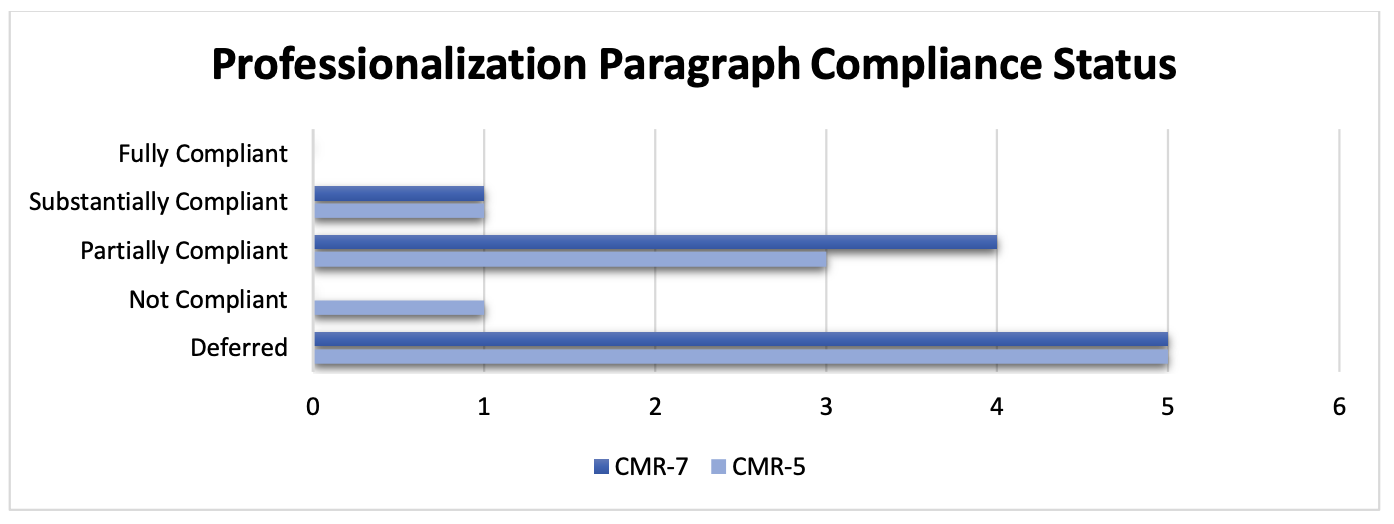
2. Use of Force
A primary hinderance in the Commonwealth’s progress towards achieving compliance with UOF has been its inability to validate its UOF numbers. This issue has been raised by the Monitor’s Office in previous CMRs as compliance assessments of many of the paragraphs within this section of the Agreement require a comprehensive review of UOFs. In response to court orders provided in the spring of 2022, the Commonwealth and PRPB, working with USDOJ and the Monitor’s Office, developed a Provisional UOF Plan to address the inconsistences in its UOF tracking.
The Provisional UOF Plan was formally implemented by PRPB on July 1, 2022 and involved increased supervisory layers of review to identify and correct errors and/or discrepancies in the data entered into UOF reporting forms within PRPB’s GTE system. PRPB’s review of its June 2022 UOFs and implementation of the plan, identified adjustments that needed to be made to ensure proper implementation of the Provisional UOF Plan. A similar review of the June 2022 UOF reports conducted by the Monitor’s Office resulted in the identification of issues in tracking, reporting, and the timely completion of these reports. A revised Provisional UOF Plan, which was reviewed and commented on by the Monitor’s Office and USDOJ, was later submitted by the Commonwealth to the Court on September 22, 2022. In regard to improving UOF reporting, PRPB has also worked with AHDatalytics, the Commonwealth’s contractor, in the development of UOF dashboards which provide the Reform Unit with the ability to comprehensively review whether certain procedural or documentary steps were taken as part of the force reporting process in the field.
Although the inconsistencies in the UOF data largely affect many of the paragraphs in this section, other topics such as FIU, Force Review Boards (FRBs), Crisis Intervention Training (CIT), SWAT, and crowd control procedures also impact PRPB’s overall compliance with this section. As it relates to FIU, the Monitor’s Office continues to remain concerned regarding the length of time FIU is taking to complete its investigations. In almost all cases reviewed, the investigations were not completed within the 45-day requirement. Similarly, in the Monitor’s review of CFRB evaluations, while the evaluations were objective, they also were not timely.
CIT, like UOF, has also been an area of discussion and focus for the court in the past few months. Despite the completion of PRPB’s CIT pilot program in November 2020, the Bureau has lagged in its effort to complete an evaluation of the pilot and expand the program to other areas of the island. Due to these issues, the court, in January 2022, requested that PRPB work with USDOJ and the Monitor’s Office to establish an evaluation committee and move progress forward with expanding the program. While PRPB has made some progress in these efforts, by producing a draft evaluation and interviewing potential CIT coordinators, its progress continues to lag due to recruitment and training challenges.
Notwithstanding the issues noted above, the Commonwealth has demonstrated progress in many of the UOF paragraphs. Much of the efforts made in CMR-7, such as PRPB’s work on the Provisional UOF Plan, collaboration with AHDatalytics, the Commonwealth’s contractor, in the development of improved UOF dashboards, and increased accountability among leadership at the area commands,represent the initial steps towards reaching increased compliance. The ripple effect of the initial efforts made in CMR-7 will, if continued, prove fruitful in subsequent reporting periods.
Overall, the Commonwealth’s compliance with the 36 paragraphs assessed during this reporting period within UOF reflect similar levels of compliance to what was noted in previous reports. In CMR-6, 53% of paragraphs (19 paragraphs) were assessed as partially compliant and 22% (5 paragraphs) were assessed as substantially compliant, in comparison to the current reporting period, where 56% of paragraphs (20 paragraphs) were found to be partially compliant and 8% (3 paragraphs) were found to be substantially compliant (paragraph 25 moved to fully compliant). The similar levels of compliance show a stall in progress. In many cases, the Commonwealth regressed in the provision of training. Six of the thirty-six paragraphs (17%) were also noted as deferred in CMR-7, because of the Commonwealth’s recent efforts to address the inconsistency in UOF reporting. See figure 3.
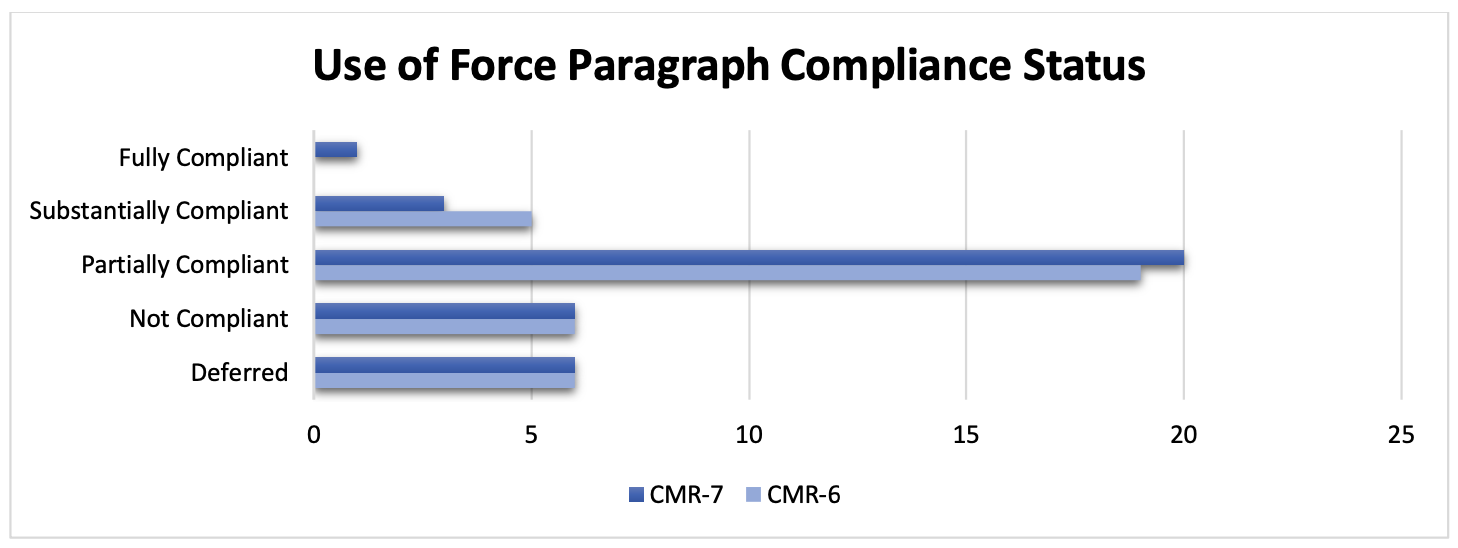
3. Searches and Seizures
Despite continual assessments of lack of compliance with many of the paragraphs within this section, the Commonwealth continues to produce arrest and search files that are incomplete and fail to contain enough information to reach a determination of probable cause. Further, the Commonwealth provided little evidence that supervisors are taking corrective actions to address these issues before approving these reports. During the CMR-7 reporting period, the PRPB Reform Unit proactively reviewed some arrest reports, many of which were corrected and improved. Though this corrective action was reflected in the reports taken from April to June 2022, similar remedies or corrective actions were not taken to address the arrest reports from July to September 2022. Further, during the CMR-7 reporting period, the PRPB Reform Unit also conducted training with various supervisors and officers within the Highway Patrol Division (HPD) across the island and reviewed the issues and corrective actions. Notwithstanding, many of the reports entered after said training continued to contain the issues noted by the Monitor’s Office. Further, limitations with GTE have also presented issues in being able to correct or amend reports within the system.
Search warrant files do better in this regard because officers’ affidavits and warrant applications are first reviewed and approved by a supervisor and a District Attorney before being submitted to a judge for approval. However, there is a serious issue pertaining to consent searches. Consent searches are delicate matters. PRPB’s PPR 612.1 is a form created to record a person’s consent to a search. However, in several cases, agents are not completing this form and supervisors are not addressing it but are instead approving these reports. The Monitor’s Office also found that PRPB is using a new category of searches, called “Propio Conocimiento,” or Personal Knowledge. The Monitor’s Office is not aware of this type of search nor is it authorized under PRPB’s search policy (GO 612). These searches were done without a search warrant and without a signed consent search form (PPR 612.1). PRPB must investigate this issue to determine its legality and report back to the Monitor’s Office.
Overall, the Commonwealth’s compliance with the 22 paragraphs assessed during this reporting period within Searches and Seizures reflect a regression in levels of compliance to what was noted in previous CMRs. In CMR-5, 36% of paragraphs (8 paragraphs) were assessed as partially compliant, in comparison to the current reporting period, where 23% of paragraphs (5 paragraphs) assessed were found to be partially compliant. See figure 4. Much of this regression is due to the continued inaction on the part of PRPB to address or demonstrate that the Commonwealth is working to address the issues raised by the Monitor’s Office in previous CMRs.
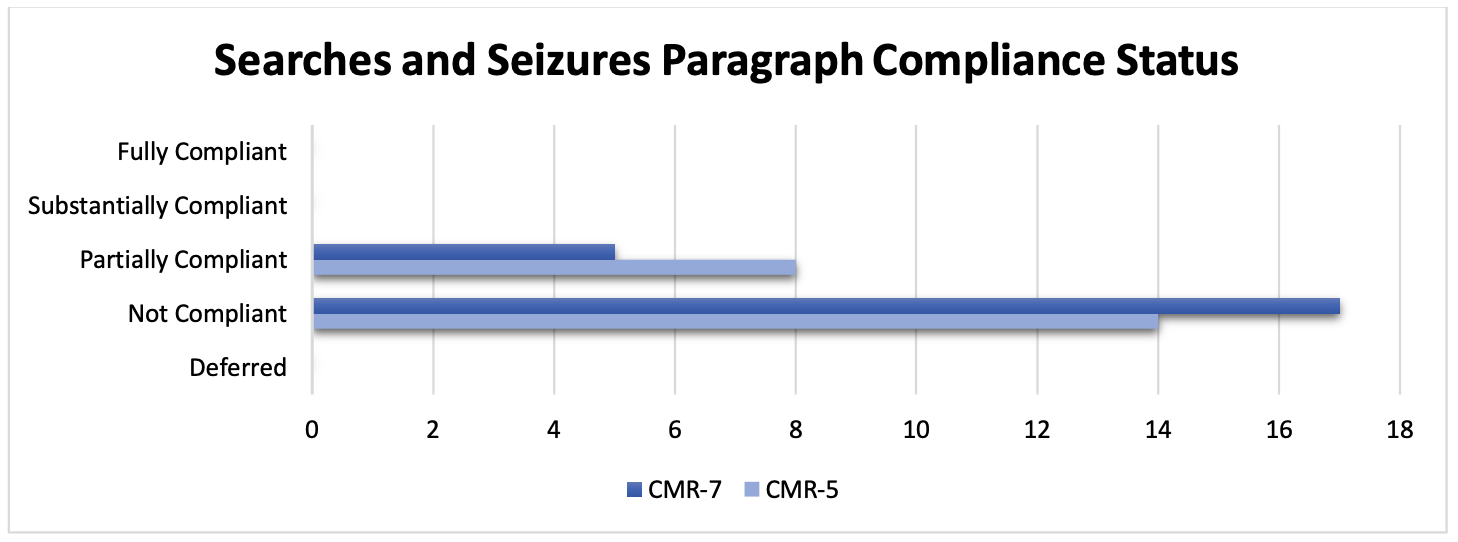
4. Equal Protection and Non-Discrimination
The review of the documents and data provided to the Monitor’s Office during the CMR-7 reporting period continued to demonstrate issues raised by the Monitor’s Office in previous CMRs. A review of 79 domestic violence investigations and 45 sexual assault investigations found that PRPB does not document the use of a trauma informed response method, consistently provide domestic violence victims with available resources on support or safety, or follow-up in a timely manner with the victim. The Monitor’s Office notes that changes to the manner that police reports are written, use of an investigative checklist, supervisor accountability, and increased training will improve the Commonwealth’s compliance with related paragraphs.
Several high-profile events and incidents occurred during the CMR-7 reporting period that have renewed the focus on domestic violence and sexual assault cases, including those involving PRPB members. The Monitor’s Office reviewed five related cases and found that PRPB does not follow its policy related to seizing officer weapons and referring the employee to the employee assistance program when a PRPB member is involved. The Monitor’s Office also continues to stress that PRPB must be consistent with policy in how it investigates cases involving PRPB members. PRPB should also consider how it assists its officers with dealing with the stressors of the job. The Monitor’s Office emphasizes that cases must be accurately investigated and processed in a timely manner to provide transparency and accountability for all parties. The Monitor’s Office also recommends that the Commonwealth develop a comprehensive response plan addressing the manner in how it deals with cases involving PRPB members.
Overall, the Commonwealth’s compliance with the 21 Equal Protection and Non-Discrimination paragraphs reflect marginal progress in levels of compliance to what was noted in previous CMRs. In CMR-5 29% (7 paragraphs) of the 21 paragraphs assessed were partially compliant and 5% (1 paragraph) was assessed as substantially compliant, in comparison to the current reporting period, where 52% of the 21 paragraphs (11 paragraphs) were found to be partially compliant and 10% (2 paragraphs) were found to be substantially compliant. See figure 5.
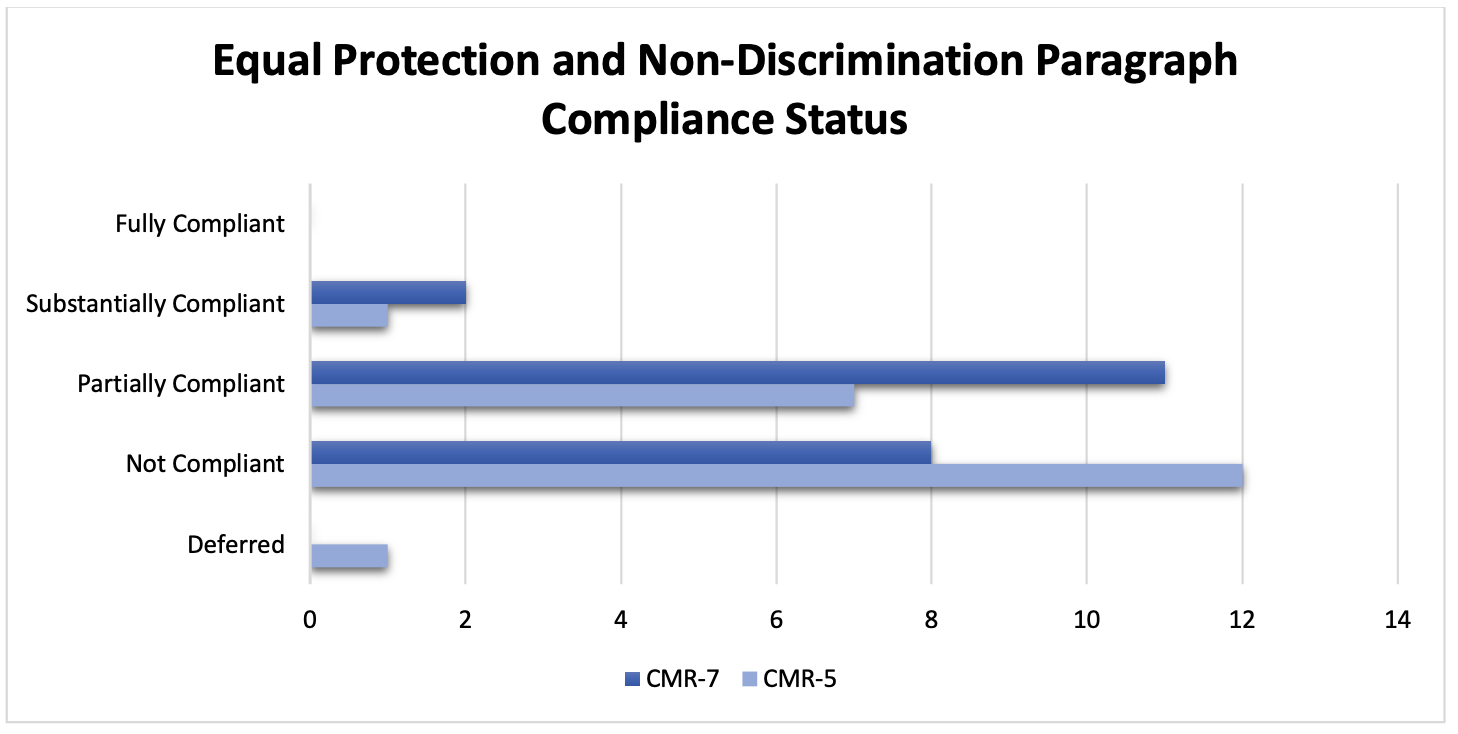
5. Policies and Procedures
The Monitor’s Office reviewed approximately 93 policies and manuals during the CMR-7 reporting period and either provided comments or approved the policies in compliance with the Agreement. Those policies routinely warn its personnel of the need to abide by the Bureau’s rules and regulations, as well as Commonwealth laws and constitutional guarantees. Personnel are also warned to report any violation of policy they observe or are aware of as well as details the consequences for failing to do so.
The Virtual Library, created in late 2021, provides easy access to policies and manuals to all officers and the public using an internet connection. The Virtual Library, as reviewed by the Monitor’s Office during the current reporting period, includes PRPB policies, manuals, and other administrative documents and is easily searchable by subject, title, or keyword. PRPB provides new and revised policies to officers through the Bureau’s Policia Informa email system.
However, PRPB is not yet able to verify or confirm that officers open and read the messages sent via Policia Informa. To this end, in May 2022, the Monitor’s Office interviewed officials at the Reform Unit in charge of policy development, as well as several field commanders regarding how they ensure that officers learn of new and revised policies. These officials stated that once they receive the documents via Policia Informa and Outlook emails, they hold monthly academies to ensure personnel are informed. They also inform officers of urgent matters during roll calls before each shift. However, policy training and implementation has stubbornly remained at a rate that is less than desirable, and PRPB has failed to hold officers and supervisors accountable.
Not holding its personnel accountable, especially supervisors and commanders, has been evident in many arrest reports, as officers continually fail to document proper probable cause and submit complete reports, as required by PRPB’s own policies and the Agreement. Supervisors and commanders also routinely fail to correct these reports before submitting them into the system. Nonetheless, despite several advisories from the Monitor’s Office, PRPB has not provided any evidence that it is or will address the issue by employing its current disciplinary system, which can include counseling and remedial training.
Training on policies is very much behind schedule, as PRPB has achieved the required 95% training compliance on only one policy, Code of Ethics and Conduct. Further delays have been experienced in the full re-implementation of the Bureau’s virtual training system. The Commonwealth and PRPB have informed the Monitor’s Office that it has started working on developing its own virtual training system.
Overall, the Commonwealth’s compliance with the eight paragraphs within Policies and Procedures reflect improved progress to what was noted in previous reports. In CMR-5, all paragraphs were assessed as partially compliant, in comparison to the current reporting period, where 75% of paragraphs (6 paragraphs) were found to be partially compliant and 25% of paragraphs (2 paragraphs) were found to be substantially compliant. See figure 6. This progress is attributed to the implementation of the Virtual Library.
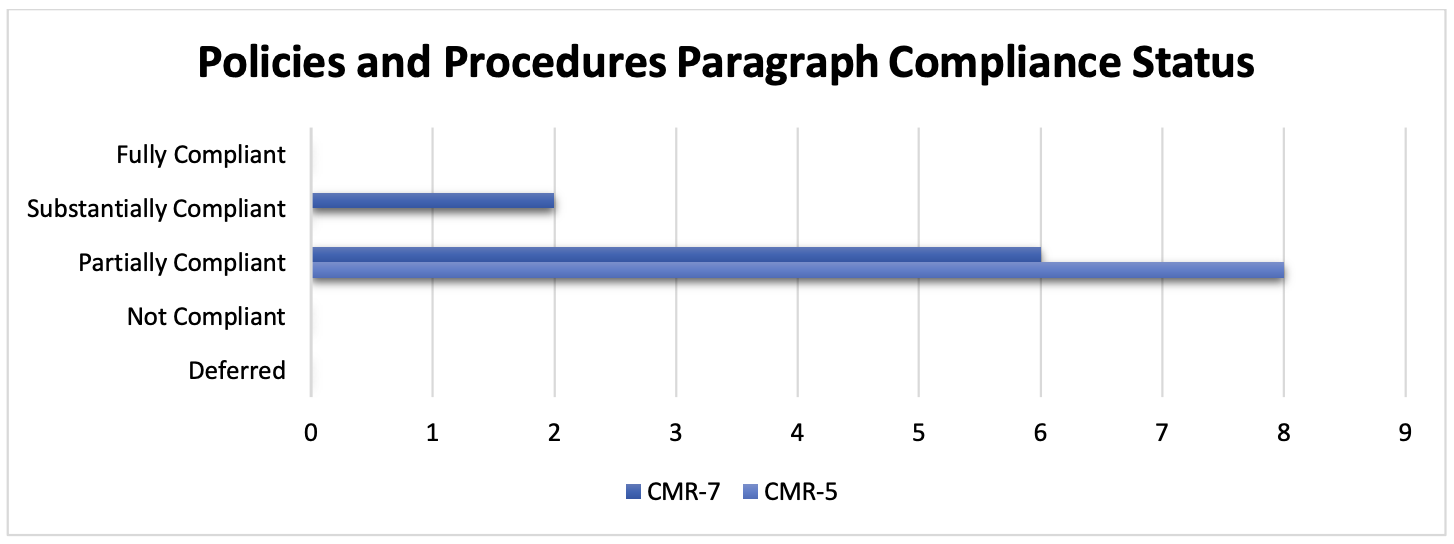
6. Supervision and Management
As has been the case in previous CMRs, the Commonwealth continues to struggle with achieving compliance with the Agreement, not only in this area, but in others as well, due to the quantity and quality of its first-line supervisors, inconsistent supervision, poor management of its promotional process, failure to develop and institutionalize adequate information technology systems to support supervision (i.e., Early Intervention System (EIS)), and lagging efforts to develop a comprehensive performance evaluation system. Despite these challenges, the Monitor’s Office has seen some progress, most notably in the Commonwealth’s efforts to comply with the related court order to implement the Staffing Plan, and initial work on development of the Integrity Unit policies and procedures. If the Commonwealth continues with this implementation and the promotion of sergeants, progress in moving compliance forward will begin to be realized in CMR-8.
Although PRPB has identified the number of first-line supervisors needed, it has not been able to achieve its goal due to past poor management and implementation of its promotional processes. As part of the Plan described in paragraph 13, PRPB advised that 740 supervisors for 110 precincts are needed based on a ratio of 6 first-line supervisors and a relief per unit. However, so far only 103 officers have been promoted to sergeant and only 10 sergeants have been promoted to lieutenant, leaving a shortage of 627 supervisors. Furthermore, in this Plan, the Commonwealth identified the need for 68 positions within the ranks of inspectors and coronels. PRPB reported that for Fiscal Year (FY) 2022-2023, no budget has been identified for these positions. The Commonwealth is currently moving forward with a plan to promote 506 sergeants under the Order of Merit List (OML) during FY 2023.
In addition to the issues with the promotion process, as reported in the past, officers interviewed continue to note issues with PRPB’s transfer policy, GO 305 (Rank System Transfer Transactions). The Commonwealth has made some progress by naming a Board responsible for designing a promotion system, which includes the administration of examinations and other more objective measures.
Overall, the Commonwealth’s compliance with the 19 Supervision and Management paragraphs assessed during this reporting period reflect similar levels of compliance to what was noted in previous CMRs. In CMR-6, 21% of the 24 paragraphs (4 paragraphs) were assessed as partially compliant, in comparison to the current reporting period, where 16% of the 19 paragraphs (3 paragraphs) were found to be partially compliant. See figure 7.
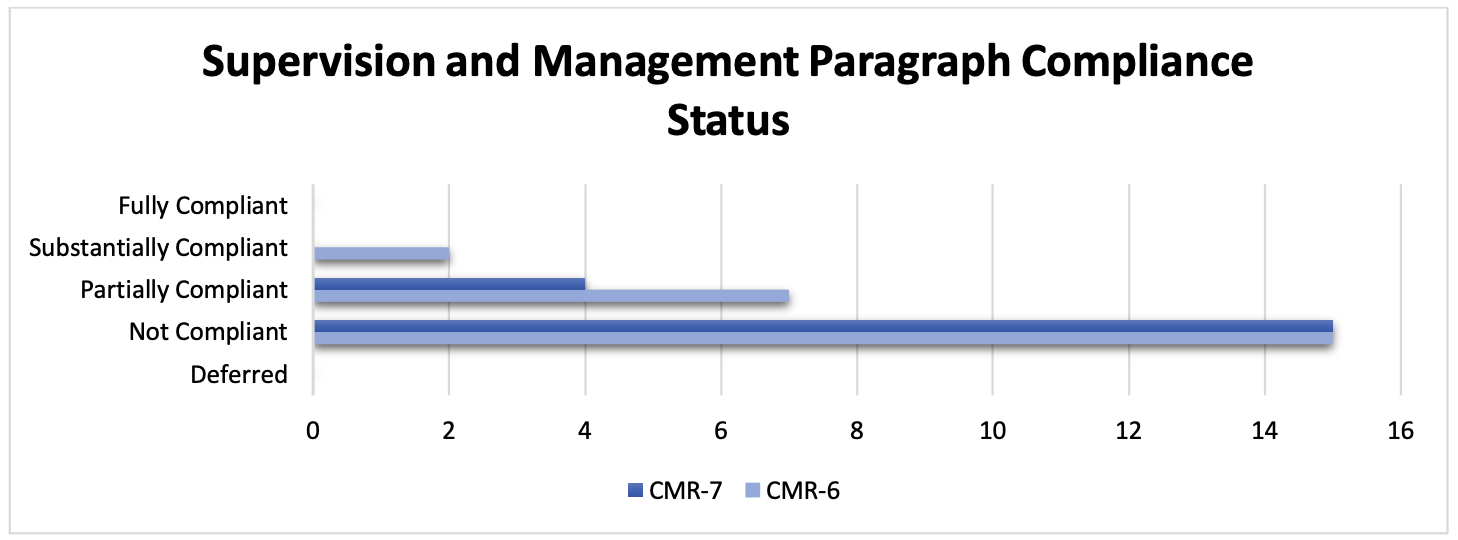
7. Civilian Complaints, Internal Investigations, and Discipline
Beginning with this reporting period, the Monitor’s Office bifurcated the analysis of SARP investigations files into two phases, Phase I and Phase II. The former is the Monitor’s contemporary assessment of PRPB compliance with respect to the internal investigation phase of PRPB members, while the latter is the Monitor’s assessment of the ensuing adjudication phase of the case.
The Monitor’s Office reviewed 53 internal disciplinary cases. Half of these cases contained investigations that concluded during the CMR-7 reporting period, and thereby were given a Phase I analysis. The remaining half were cases containing a Final Resolution and was signed by the Police Commissioner during the CMR-7 reporting period. Accordingly, the Monitor’s Office subjected these cases to both Phase I and Phase II analysis. Each tranche of cases contained an array of alleged police misfeasance, malfeasance, and non-feasance including allegations of domestic violence, corruption, and reprisal.
The Monitor’s Office finds that overall, internal investigations were conducted well and were eventually adjudicated in accordance with the facts. One common lagging area concerns documenting case milestones, including investigative assignment date, conclusion date, supervisory review date, area command review date, and overall SARP review date. Many supervisory review forms are submitted without a date. Some cases are missing documents that would prove that the case met all the deadlines prescribed within the Agreement. Simply by being more vigilant in the future, PRPB could improve its compliance level drastically.
Training continues to be another area of subpar performance. The Monitor’s Office acknowledges that the COVID-19 pandemic had a devastating impact on presential training. That said, PRPB must redouble its efforts to eliminate the backlog in training areas. Present documentation indicates that PRPB officers lack training in many topics related to this section, such as the civilian complaint program. Investigative training and professional development are also a key concern.
As has been highlighted by the Monitor’s Office in previous CMRs, and despite SARP command efforts to request procurement, overall resources, staffing, and equipment continue to be of some concern. While the Monitor has seen some positive developments regarding the SARP vehicular fleet and the delivery of some requested hardware, the continuing lack of adequate resources affects the quality and timeliness of investigations and has an even greater negative impact on the adjudicative phase of an internal investigation. The Commonwealth must quickly connect SARP to essential resources it requires to perform its mission.
Although much remains to be done, the Monitor’s Office has seen continued success in various paragraphs, including paragraph 161, which covers civilian complaint forms design, paragraph 169, covering complaint intake protocol, paragraph 170, covering complaint classification and assignment, paragraph 172, covering supervisory handling of complaints against a PRPB member, paragraph 187, covering scenarios involving a reluctant complainant, and paragraph 190, covering SARP command and OPC review of SARP investigations.
Overall, the Commonwealth’s compliance with the 46 paragraphs assessed during this reporting period within Civilian Complaints, Internal Investigations, and Discipline reflect a progression in compliance to what was noted in previous reports, largely because many paragraphs assessed in CMR-6 were deferred by the Monitor’s Office due to incomplete datasets. In CMR-6, 28% of paragraphs (13 paragraphs) were assessed as partially compliant and 28% (13 paragraphs) were assessed as substantially compliant, in comparison to the current reporting period, where 48% of paragraphs (28 paragraphs) were found to be partially compliant and 35% (16 paragraphs) were found to be substantially compliant. One paragraph (2%) was noted as deferred in CMR-7. See figure 8.
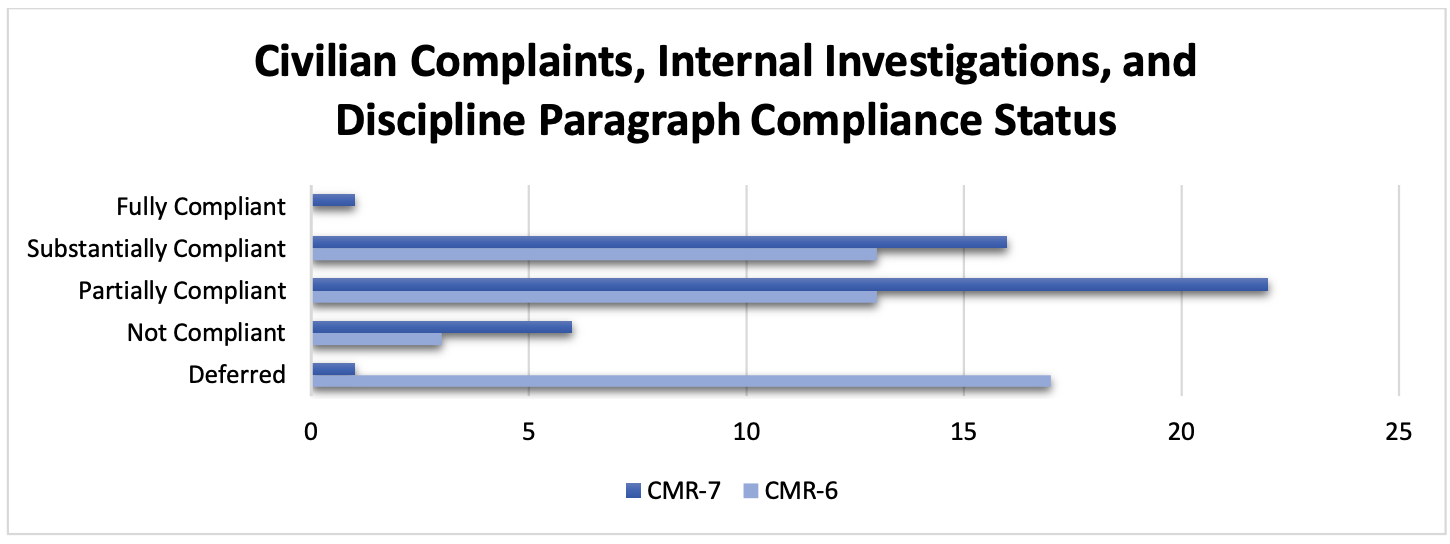
8. Community Engagement and Public Information
Community Policing and Public Information includes 13 paragraphs in the Agreement - 4 of which are assessed annually (Paragraphs 208-210 and 213). A complete review of all 13 paragraphs was captured in CMR-6 and will be provided again in CMR-8. This report assesses compliance with nine paragraphs: 205-207, 211-212, and 214-217.
The paragraphs assessed during the CMR-7 reporting period primarily focused on the Commonwealth and PRPB’s efforts to demonstrate the implementation of community policing, including: recruitment practices focused on community policing; performance appraisals; deployment of personnel responsible for community engagement efforts; collaborative problem-solving activities under the SARA Model; community outreach activities purposely focused on education and prevention; and improving citizen’s quality of life through strategic planning and vested community interactions.
As noted in previous CMRs, most of the Commonwealth’s progress in this section is rated at partial or not compliant. Much of this is the result of the ineffective execution of a comprehensive approach to community policing; limited and deficient implementation of the SARA Model, lack of training in community policing, staffing challenges resulting in inadequate supervision, inconsistencies in community policing approaches, strategic follow through on community engagement, insufficient communication and public transparency around data, such as UOF and crime statistics, and purposeful community outreach activities.
During the CMR-7 reporting period, the Monitor’s Office met and interviewed various members of PRPB directly involved in community engagement, community policing, and outreach at the district, precinct, and area command levels in 11 police areas. Additionally, the Monitor’s Office attended and observed several community events hosted by PRPB, including an open meeting (Encuentro Comunitario) in Caguas, a community discussion (Conversatorio) held by the Guayama CIC, a CIC spokesperson meeting at the central level held at PRPB headquarters, and a public meeting hosted by PRPB in San Juan.
In addition to these on-site activities and observations, the Monitor’s Office also reviewed several related policies and manuals and informally reviewed the training curriculum for Community Policing developed by the Reform Office for training implementation through SAEA.
Despite these efforts, the documents submitted to the Monitor’s Office by PRPB in demonstration of compliance failed to show an operational implementation towards the institutionalization of community policing beyond the PRPB Community Relations Bureau, as required by the Agreement in paragraphs 21, 103, 145, and 205 through 208.
Community policing at the district and precinct levels denotes limited, if not, null implementation of purposeful and meaningful outreach activities for education, awareness, and prevention. Although some police areas certified having engaged in outreach activities, PRPB failed to provide comprehensive documentation to support these certifications. The deficiencies outlined during CMR-6 regarding the implementation of problem-solving through use of the SARA Model remain unimproved. The Monitor’s Office noted that despite technical assistance received from the Reform Office, some police areas confirmed not implementing the model for problem-solving and/or failed to use the appropriate PPRs in support of operational processes. Among salient deficiencies, the Monitor’s Office found failure to implement effective responses, resulting from insufficient analysis (problems lacking definition or left blank) and/or insufficient community involvement from government agencies or other entities, and the use of the module to report quality of life situations, (i.e., “Caravana no balas al aire” and escort services to community members in support of an outreach activity). The Monitor’s Office further noted that although a community policing module to record community policing activities throughout the entire Bureau, was launched on July 1, 2022, and is in its initial stages of implementation, the documents reviewed reflect that not all areas are consistently using the module and not all activities have been appropriately recorded within the module, which highlights the need to establish standard operating procedures including data quality validation and protocols for effective use of the module.
PRPB’s continued failure to conduct community policing training has also prevented it from reaching substantial compliance with this section.
As is the case with the other sections in this CMR, PRPB did not provide projected timelines or training schedules for community policing related training courses. The issues with training are also exacerbated by staffing challenges, particularly among supervisors. Inadequate supervision and frequent changes to leadership, compromise the Bureau’s efforts to ensure agents are performing effectively and consistently in how each police area at the precinct and district levels engage with their communities.
Finally, although PRPB’s efforts to share information through social and mass media have increased and it is reporting on police activities, criminal interventions, and efforts to solve crime more frequently, it is still deficient at using the media and its internal resources to educate, clarify, and demystify public misconceptions about UOF, non-discriminatory practices, and rights to file administrative complaints and investigation processes, particularly during public manifestations. The Monitor’s Office also finds that PRPB continues to struggle to share crime statistics with the public in an adequate, accurate, and efficient manner to meet compliance with the Agreement.
Overall, the Commonwealth’s compliance with the nine Community Engagement and Public Information paragraphs assessed during this reporting period, reflect similar levels of compliance noted in CMR-6. In CMR-6, 46% paragraphs (6 paragraphs) were assessed as partially compliant, in comparison to the current reporting period, where 44% of paragraphs (4 paragraphs) were found to be partially compliant; all other paragraphs are noted as not compliant. See figure 9.
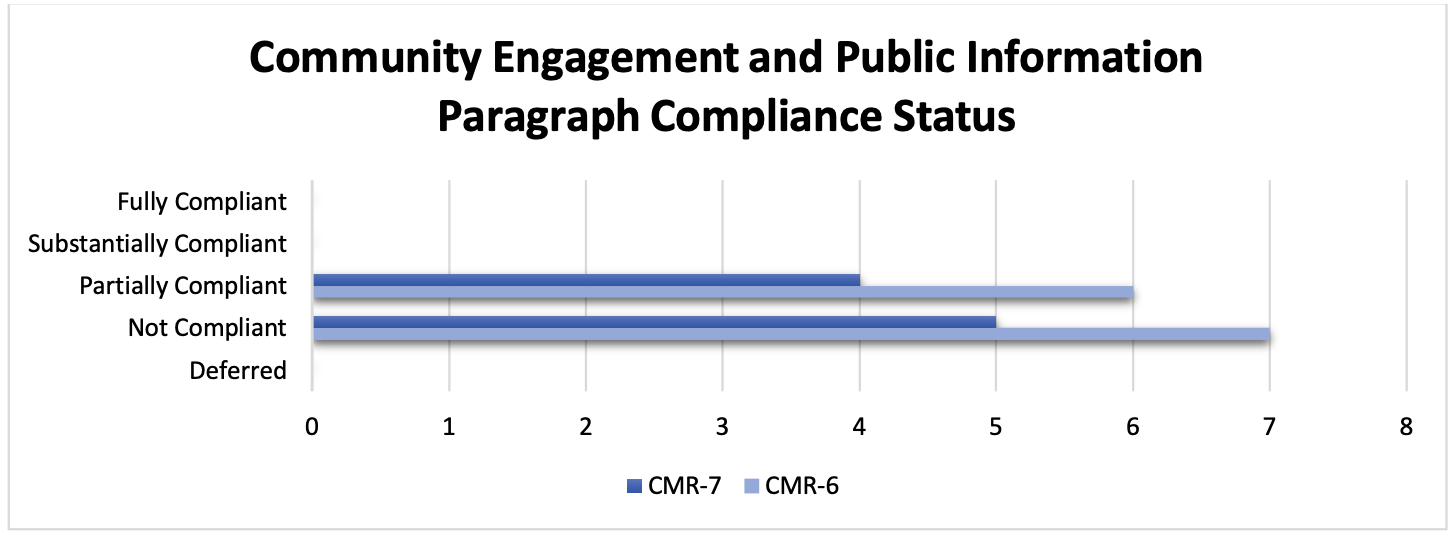
9. Information Systems and Technology
The Commonwealth made some progress during the CMR-7 reporting period but not without direct involvement from the Monitor’s Office, subject matter experts for AHDatalytics and Gartner Inc, USDOJ, and the Court. This cannot be understated. While correcting the functionality of its technology capabilities is positive, the Commonwealth has yet to demonstrate a self-sustaining capacity, or sufficient advocacy from senior leadership, to drive the PRPB Bureau of Technology efforts forward and deliver effective technology solutions. During the CMR-7 reporting period this was evident in the continuing troubled developments in the operationalization of PTMS and implementation of NIBRS, the numerous corrections needed to GTE in response to UOF data flaws exposed during data entry, the inconsistent use and operational status of Promedia, and the Bureau of Technology’s continuing mischaracterization of the “operational availability” of its systems. Technology best case convention requires that to meet full operational availability, functionality minimums must be met, key performance parameters must be satisfied, full testing has been completed, and training is available. This is not actually the case. Basic development continues on most projects, and training from SAEA is unavailable. For these reasons the Commonwealth is at risk of backsliding technologically and operationally despite past progress made. Also impactful to the above conditions, senior leadership involvement and support of IT activities has yet to occur unambiguously. The apparent lack of involvement raises the question of top-down commitment to the priority of technology modernization.
On February 28, 2022, a Join Stipulation on IT was filed with the Court by the Commonwealth of Puerto Rico and USDOJ. The Joint Stipulation, updated on April 12, 2022, established the timeline and tasks associated with the IT Needs Assessment and development of the Action Plan. On April 18, 2022, the Court approved the updated Joint Stipulation. In July 2022, the Monitor’s Office contracted Gartner, Inc. to conduct the IT Needs Assessment and subsequently work with the Commonwealth and PRPB, through its executive-level committee, to develop the Action Plan.
The IT Needs Assessment and subsequent Action Plan will be completed by March 2023, as such much of the impact that this work will have on PRPB’s progress in achieving compliance will likely not become a reality until 2023 – 2024.
In addition to the IT Needs Assessment, PRPB’s work with AHDatalytics will also complement and assist progress towards compliance. During the August monthly review with AHDatalytics, the Monitor’s Office was encouraged by their success with mocking-up useful dashboards. Also positive, AHDatalytics noted that the Reform Unit had been using the new awareness to rethink questions and ask for more dashboard content, the exact outcome sought from the re-platforming of PRPB’s analytics practice.
During the May field visit to Arecibo, the team received CAD, GTE, and PTMS demonstrations from the IT coordinator. His very successful efforts to repurpose machines and build out a dedicated training center that also reduced agent travel time to Gurabo are laudable and should be replicated throughout PRPB. Disappointingly, the comments the Monitor’s Office heard during this visit also spoke to the limits and challenges faced including that most staff are not trained on the systems, that data in CAD and GTE were not being scrubbed all the way through to reconciliation, and that there are lags in editing.
The Bureau of Technology continues to be hampered by limited resources and access to experienced subject matter experts. Fortunately, the availability of both AH Datalytics and Gartner Inc. has been immediately beneficial. Retaining the knowledge and practices that have emerged must be a priority for senior leadership at both PRPB and DSP. AHDatalytic’s output is and will have direct bearing on PRPB’s ability to establish its analytical capacity and knowledge base for transforming operations. Similarly, Gartner Inc’s perspective will add context to PRPB’s ability to impact its management maturity level. Their report will be available during CMR-8.
Lack of mission procedure clarity is the most significant contributing factor to IT functionality deficits and sufficient development progress. IT demonstrations have borne out that procedural inconsistencies across PRPB jeopardize the quality of data collected, entered, and retrieved from GTE and complicates its portability. Comments from agents during field visits and in dialog with the Chief Information Officer’s (CIO) staff in May showed this condition to be consistent with NIBRS as well. Finally, although easy to presume these shortcomings are the responsibility of the Bureau of Technology, in fact, the instability of operational processes falls squarely on both senior leadership and supervisors in operations for the lack of operational process definition, as well as the Bureau of Technology.
Overall, the Commonwealth’s compliance with the six Information Systems and Technology paragraphs is unchanged from CMR-6 where 33% of paragraphs (two paragraphs) were found to be partially compliant and 66% of paragraphs (four paragraphs) were found to be not compliant. This holds true for the CMR-7 reporting period. See figure 10.
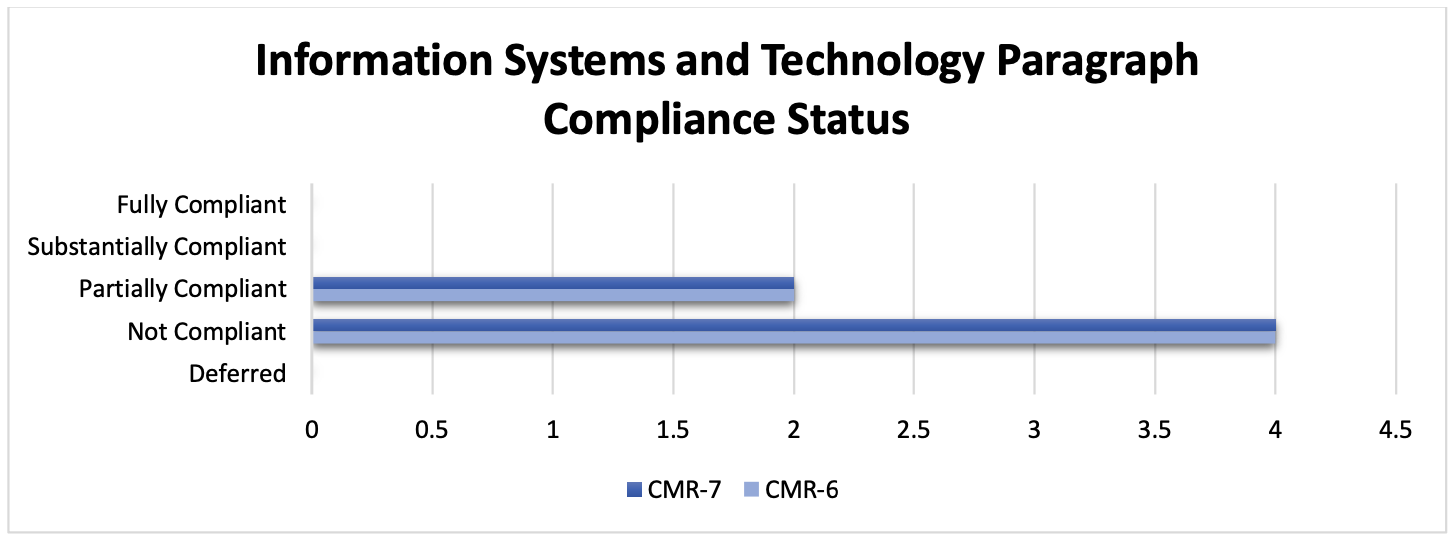
The online version of this
Executive Summary for the
Report is provided for convenience only.
The document filed in The United States District Court for the District of Puerto Rico is the definitive version:
Case 3:12-cv-02039-FAB Document 2264-2 Filed 12/15/22